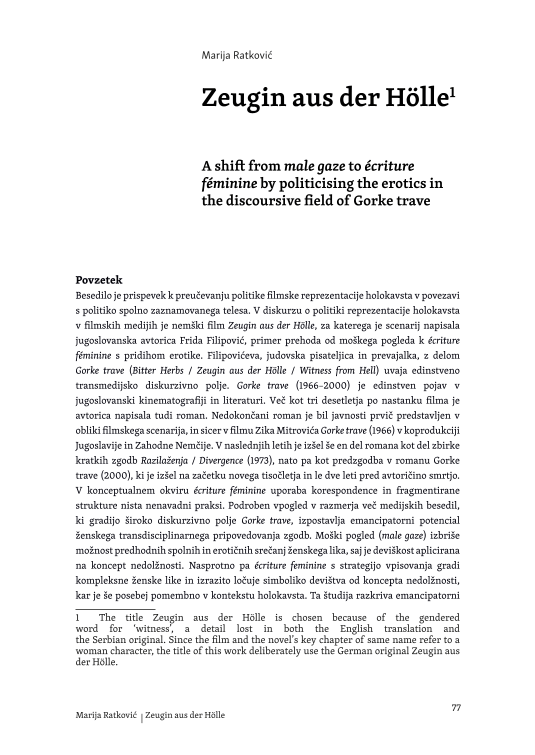The text is a contribution to the study of the politics of film representation of the Holocaust regarding the politics of the gendered body. In the discourse on the politics of Holocaust representation within the film media, Zeugin aus der Hölle (Gorke trave), a German film scripted by Yugoslav author Frida Filipović, serves as a case study for a shift from the male gaze to écriture féminine with elements of eroticism. Filipović, a Jewish writer and translator, introduces a unique transmedial discoursive field through her work Gorke trave (Bitter Herbs / Zeugin aus der Hölle / Witness from Hell). Gorke trave (1966–2000) is a unique phenomenon in Yugoslav cinematography and literature. A novelization emerged more than three decades after the film’s creation. The unfinished novel was presented to the public for the first time in the form of a film script, the film Zika Mitrović’s Gorke trave (1966), co-produced by Yugoslavia and West Germany. In the following years, another segment appeared as part of the short story collection Razilaženja / Divergences (1973), and then as a prequel in the romanesque structure of Gorke trave (2000), published at the beginning of the new millennium, and only two years before the author’s death. Within the conceptual framework of écriture féminine, the use of correspondence and fragmented structure are not unusual practices. Detailed examination of the relationships of several media texts that construct the wide discoursive field of Gorke trave highlights the emancipatory potential of women’s transdisciplinary storytelling. The male gaze equates virginity with innocence, thereby erasing the possibility of the previous sexual and erotic encounters for women characters. Conversely, écriture féminine employs the strategy of inscription to build complex woman characters and distinguish between the symbolism of virginity and the concept of innocence, which is of particular significance within the context of the Holocaust. This study reveals the emancipatory potential of transdisciplinary narrative strategies, with an emphasis on multiple marginalized identities, politics of corporeality, women’s sexuality and emotional life as a form of political subjectivisation, and Holocaust testimony in literature. The woman’s lived experience is the focus of realism in the prose of Frida Filipović, which could be seen as transgressive and radically realistic even today. Bodily truth in Gorke trave does not recognize limitations and must be told regardless of the multiple transgressions –within the act of speech itself, resistance to the male gaze, incidental shock effects, and continuous processes of marginalization.




